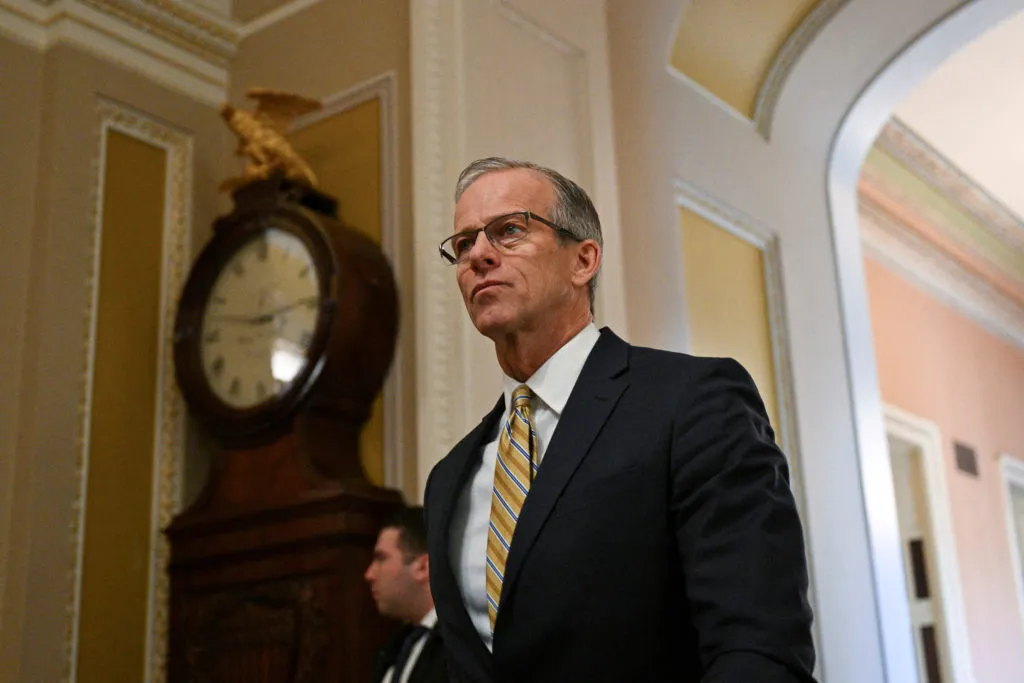
WASHINGTON (AP) — As House Republicans missed another deadline to produce a substantial budget package focusing on tax cuts and reduced spending, Senate Republicans have taken the lead. They have unveiled a more tailored $340 billion blueprint that emphasizes President Donald Trump's deportation agenda and enhanced U.S. defense spending.
Speaker Mike Johnson acknowledged that his chamber’s plan for Trump's significant budget bill would extend into the weekend as House Republicans work overtime on finalizing the details. After an extensive meeting with the Republican president at the White House, they are swiftly working towards agreeing on a package that includes approximately $4 trillion in tax breaks, considerable program cuts, and a potential extension of the nation's debt limit.
“We have just a few final details to iron out,” Johnson mentioned at the Capitol. “It’s going well, and I’m very excited about the progress,” he added.
Frustration is growing among GOP lawmakers as they struggle to deliver on Trump’s legislative priorities in the early days of unified control of the executive and legislative branches. Conversely, Senate Republicans, led by Senate Majority Leader John Thune of South Dakota, are advancing a two-step proposal. The initial bill would include funding for Trump's border wall and deportation plans, with a more comprehensive tax break extension to follow before year's end.
The Senate Budget Committee proposed new spending to complete the border wall, increase Border Patrol agents, and strengthen the U.S. Navy with additional defense systems to counter threats.
While the House grapples with internal disagreements, Senate Republicans aim to deliver on the administration's goals with efficiency. The Senate's budget proposal includes cuts in other federal expenditures to balance its $85.5 billion annual costs over Trump's second term, totaling $340 billion.
Close majorities in both chambers mean that Republicans must align closely to achieve these goals. Speaker Johnson needs near-unanimous support to pass any bill over Democratic objections. In the Senate, the marginal 53-47 majority gives scant space for dissent.
White House Press Secretary Karoline Leavitt stated that ongoing discussions include "tax priorities of the Trump administration." This includes eliminating federal taxation on tips, Social Security benefits, and overtime pay. Renewal of the tax cuts initiated by the 2017 Trump administration is also on the agenda.
House Republicans are striving for a "big, beautiful bill" that would extend massive tax cuts while funding Trump's deportation and border initiatives. The proposal includes significant cuts — from healthcare to food assistance — to offset tax reductions.
Currently, House GOP leaders proposed budget savings of $1 trillion over the next decade. However, certain conservative members are advocating for savings double that amount, at $2.5 trillion.
Chair of the House Budget Committee, Rep. Jodey Arrington of Texas, voiced optimism about reaching budget goals, stating, “We’re not far. We’re not far.” He emphasizes the need for the chamber’s will to achieve a “stretch goal” of $2.5 trillion in savings over ten years.
As the budget negotiation process continues, Trump remains focused on the results rather than the methods, urging Congress to fulfill his campaign promises. Meanwhile, citizens across the country are increasingly vocal in opposing cost-cutting measures targeting federal services.